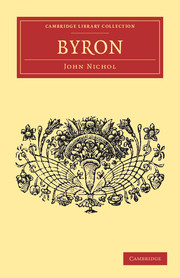
-
Select format
-
- Publisher:
- Cambridge University Press
- Publication date:
- 05 October 2012
- 24 November 2011
- ISBN:
- 9781139083812
- 9781108034555
- Dimensions:
- Weight & Pages:
- Dimensions:
- (216 x 140 mm)
- Weight & Pages:
- 0.3kg, 234 Pages
You may already have access via personal or institutional login
Book description
George Gordon, Lord Byron (1788–1824) is regarded as one of Britain's greatest poets. As famous for his personality as he was for his poetry, he was rebellious, extravagant and controversial, his life peppered with scandal. First published in the English Men of Letters series in 1880, this biography by John Nichol (1833–94), who also wrote on Carlyle for the series, argues that while Byron did not shape the Romantic era, his work was still highly influential on his contemporaries. Setting Byron's work in an historical context, Nichol shows how the society of his time both idolised him and condemned him as a moral outcast; he was also greatly admired for his efforts for the liberation of Greece from the Ottoman Empire, during which he died. Nichol also discusses the creation of the 'Byronic hero', as much a reflection of Byron's flamboyant persona as an invented literary character.
Contents
Metrics
Full text views
Full text views help Loading metrics...
Loading metrics...
* Views captured on Cambridge Core between #date#. This data will be updated every 24 hours.
Usage data cannot currently be displayed.
Accessibility standard: Unknown
Why this information is here
This section outlines the accessibility features of this content - including support for screen readers, full keyboard navigation and high-contrast display options. This may not be relevant for you.
Accessibility Information
Accessibility compliance for the PDF of this book is currently unknown and may be updated in the future.

